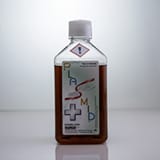Title
Twists and Turns in Protein Expression: In Early Drug Discovery it's Often Unclear Which Recombinant Proteins Will Be Affected by Changing the Host Cell
Description
In Early Drug Discovery it's Often Unclear Which Recombinant Proteins Will Be Affected by Changing the Host Cell When drug developers use different cell lines for manufacturing and preclinical research, they risk generating inconsistent results, proteins with various structures and functions. Then, confounded by variability, drug developers may la...
Visit PageTwists and Turns in Protein Expression: In Early Drug Discovery it's Often Unclear Which Recombinant Proteins Will Be Affected by Changing the Host Cell
In Early Drug Discovery it's Often Unclear Which Recombinant Proteins Will Be Affected by Changing the Host Cell When drug developers use different cell lines for manufacturing and preclinical research, they risk generating inconsistent results, proteins with various structures and functions. Then, confounded by variability, drug developers may lavish attention on irrelevant candidates and overlook promising candidates. To avoid misleading themselves, drug developers must find ways to avoid or account for protein variants, which include post-translational modifications, particularly alternative glycosylations. Such variants occur all too frequently among different host cell lines, an extensive body of literature documents. Variability is most evident when comparisons are made between mammalian and nonmammalian cells, says James Brady, Ph.D., vice president of technical applications and customer support at MaxCyte. “But depending on the protein that is being produced, even different mammalian cell lines, such as HEK and CHO, will exhibit substantial differences in post-translational modifications.” Differences can lead to altered protein stability, activity, or in vivo half-life. It is often unclear during the early drug discovery process which recombinant proteins will be affected by changing the host cell. However, misleading early-stage data are associated with significant costs and extended timelines. It therefore makes sense to adopt a single host cell for all stages of the development pipeline. That is the rationale behind MaxCyte's flow electroporation transfection platform.
Related Application Notes
Improved DNA Protocol for E.coli with Plasmid+® Media
Plasmid+® liquid media is an enriched media specifically designed for plasmid DNA production. Plasmid+® supports much h...
See Application Note

